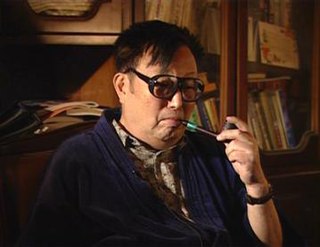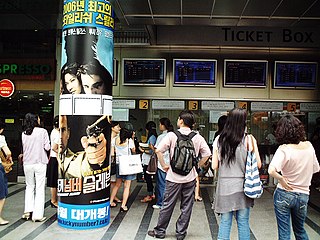| Lists of South Korean films by year |
|---|
 |
| Korean Animation |
A list of films produced in South Korea in 1998:
| Lists of South Korean films by year |
|---|
 |
| Korean Animation |
A list of films produced in South Korea in 1998:

South Korea, officially the Republic of Korea (ROK), is a country in East Asia. It constitutes the southern part of the Korean Peninsula and borders North Korea along the Korean Demilitarized Zone. The country's western border is formed by the Yellow Sea, while its eastern border is defined by the Sea of Japan. South Korea, like its northern counterpart, claims to be the sole legitimate government of the entire peninsula and adjacent islands. It has a population of 51.96 million, of which roughly half live in the Seoul Capital Area, the fourth most populous metropolitan area in the world. Other major cities include Incheon, Busan, and Daegu.

Kim Dae-jung, often referred to by his initials DJ, was a South Korean politician and activist who served as the 8th president of South Korea from 1998 to 2003.
The year 1998 in film involved many significant films, including Shakespeare in Love, Saving Private Ryan, Armageddon, American History X, The Truman Show, Primary Colors, Rushmore, Rush Hour, There's Something About Mary, The Big Lebowski, and Terrence Malick's directorial return in The Thin Red Line.

The term "Cinema of Korea" encompasses the motion picture industries of North and South Korea. As with all aspects of Korean life during the past century, the film industry has often been at the mercy of political events, from the late Joseon dynasty to the Korean War to domestic governmental interference. While both countries have relatively robust film industries today, only South Korean films have achieved wide international acclaim. North Korean films tend to portray their communist or revolutionary themes.

Manhwa is the general Korean term for comics and print-cartoons. Outside Korea, the term usually refers to South Korean comics. Manhwa is directly influenced by Japanese Manga comics. Modern Manhwa has extended its reach to many other countries. These comics have branched outside of Korea by access of Webtoons and have created an impact that has resulted in some movie and television show adaptations.

The Korean Wave or Hallyu is a cultural phenomenon in which the global popularity of South Korean popular culture has dramatically risen since the 1990s. Worldwide interest in Korean culture has been led primarily by the spread of K-pop and K-dramas, with keystone successes including BTS and Psy's "Gangnam Style", as well as Jewel in the Palace, Winter Sonata, and Squid Game. The Korean Wave has been recognized as a form of soft power and as an important economic asset for South Korea, generating revenue through both exports and tourism.

Kim Ki-young was a South Korean film director, known for his intensely psychosexual and melodramatic horror films, often focusing on the psychology of their female characters. Kim was born in Seoul during the colonial period, raised in Pyongyang, where he became interested in theater and cinema. In Korea after the end of World War II, he studied dentistry while becoming involved in the theater. During the Korean War, he made propaganda films for the United States Information Service. In 1955, he used discarded movie equipments to produce his first two films. With the success of these two films Kim formed his own production company and produced popular melodramas for the rest of the decade.

Hong Sang-soo is a South Korean film director and screenwriter. An acclaimed and prolific filmmaker, Hong is known for his slow-paced films about love affairs and everyday dilemmas in contemporary South Korea.

Daniel Philip Henney is an American actor and model. He first came into international prominence with his television debut as Dr. Henry Kim on the Korean drama My Lovely Sam Soon (2005).
Kang Woo-suk is a South Korean film producer and director. He has often been called the most powerful man in Korean cinema, topping Cine21 magazine's list of '50 Most Powerful Men in Korean Cinema' for seven consecutive years from 1998 to 2004.

The cinema of North Korea began with the division of Korea and has been sustained since then by the ruling Kim dynasty. Kim Il-sung and his successor Kim Jong-il were both cinephiles and sought to produce propaganda films based on the Juche ideology.

South Korean films have been heavily influenced by such events and forces as the Korea under Japanese rule, the Korean War, government censorship, the business sector, globalization, and the democratization of South Korea.
Korean horror films have been around since the early years of Korean cinema, however, it was not until the late 1990s that the genre began to experience a renewal. Many of the Korean horror films tend to focus on the suffering and the anguish of characters rather than focus on the explicit "blood and guts" aspect of horror. Korean horror features many of the same motifs, themes, and imagery as Japanese horror.

Jung is a Latin alphabet rendition of the Korean family name "정", also often spelled Jeong, Chung, Joung or Jong. As of the South Korean census of 2015, there were 2,407,601 people by this name in South Korea or 4.84% of the population. The Korean family name "정" is mainly derived from three homophonous hanja. 鄭 (2,151,879), 丁 (243,803) and 程 (11,683). The rest of the homophonous hanjas include: 政 (139), 桯 (41), 定 (29), 正 (22) and 情 (5).
This is a list of films by year produced in the country of South Korea which came into existence officially in September 1948. The lists of Korean films are divided by period for political reasons. For earlier films of united Korea see List of Korean films of 1919–1948. For the films of North Korea see List of North Korean films. For an A-Z list of films see Category:Korean films.

Spring in My Hometown is a 1998 South Korean film.
CJ Entertainment is a South Korean film production and distribution company under CJ ENM Entertainment Division. The company operates as a film production company, film publishing house, investment and exhibition.
The Korean Film Council (KOFIC) is a state-supported, self-administered organization under the Ministry of Culture, Sports and Tourism (MCST) of the Republic of Korea.